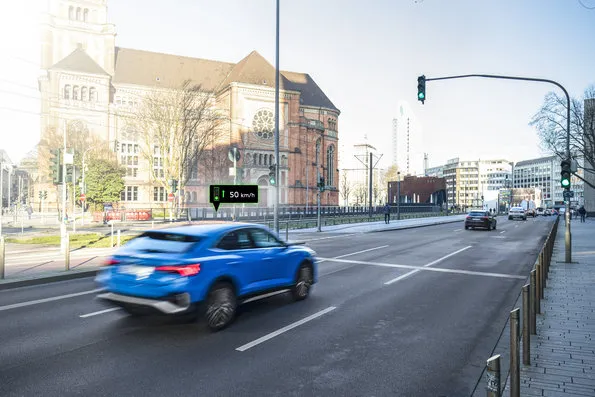
Audi says 450 of the city’s 600 intersections will be networked with the Vehicle to Infrastructure service by early summer.
The solution's green light optimised speed advisory is expected to calculate the ideal speed for catching a ‘green wave’ of traffic lights. It also offers suggestions to gradually reduce speed around 350m ahead of the traffic lights so that drivers and the cars behind can reach the intersection when the lights turn green, the company adds.
If stopping at a red light is unavoidable, a countdown displays the seconds remaining until the next green phase begins.
Andre Hainzlmaier, head of development for apps, connected services and smart city at Audi, emphasises the importance of being able to predict how traffic lights will behave in the next two minutes in order to increase traffic safety.
“At the same time, exact forecasts are the biggest challenge,” he says. “Most signals react variably to traffic volume and continuously adapt the intervals at which they switch between red and green.”
The manufacturer says an analytical algorithm developed in collaboration with Traffic Technology Services calculates exact predictions while also learning how traffic volume changes in, for example, morning commuter traffic or at midday when children leave nurseries and schools.
Audi's fleet sends anonymised data to a backend system when traffic lights are crossed – the idea is to check whether the actual crossings correspond to the forecast data.
“Only after this are the traffic lights cleared for the display in the car,” Hainzlmaier adds.
In future, cities will receive data on whether cars stop unusually often at a particular intersection – or if the average waiting is comparatively long.
“We aggregate the recorded data into reports that we will make available to the city authorities. Traffic lights can then be given more efficient phasing and traffic will flow better,” Hainzlmaier concludes.
Audi Traffic Light Information operates in all Audi e-tron, A4, A6, A7, A8, Q3, Q7 and Q8 models that have been produced since mid-July 2019 (the 2020 model year). Pre-requisites include the Audi connect Navigation & Infotainment package and the optional camera-based traffic-sign recognition.








